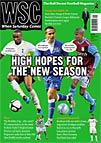 Visits to exotic climes are nothing new for English clubs. Simon Hart charts a trailblazing trip a century ago
Visits to exotic climes are nothing new for English clubs. Simon Hart charts a trailblazing trip a century ago
"The pioneers of football in foreign lands.” It sounds like a slogan dreamed up by some Premier League executive bent on selling the “39th game”. In fact these were the words of Everton director EA Bainbridge describing the ground breaking tour of Argentina and Uruguay jointly undertaken 100 years ago by his club and Tottenham Hotspur. The duo made history by facing off in Buenos Aires in the first match played between two professional teams in Latin America.
Unlike the contemporary Everton squad who jetted off to North America this summer in expensive comfort, their 1909 counterparts did it the hard way. While travelling directors went in first-class, the Everton and Spurs players had to settle for second-class on the three-week sea-voyage. (Little wonder, perhaps, that Everton, top-flight runners-up in 1909, slipped to tenth the next season.)
That was no concern to Bainbridge when he reported on “a most pleasant and instructive trip” in the Liverpool Echo that July after what must have been the adventure of a lifetime for those involved. Their itinerary included stops at Lisbon, Madeira, Cape Verde, Bahia and Rio de Janeiro though a missed train at Waterloo meant the Spurs party almost did not get out of the Solent, never mind to South America. Late for the HMS Araguaya’s departure from Southampton, they had to charter a tug to catch up with the ship.
Among the diversions on board was a Derby sweepstake – some things have not changed – and a fancy dress ball to mark Argentine independence day. Dressing up as Bo Peep did Everton’s Robert Balmer no harm as he subsequently struck the opening goal on South American soil in the match between the English sides that kicked off the tour on June 6. Argentine president José Figueroa Alcorta and his foreign and defence ministers were among the 10,000 crowd at the game, which finished 2-2. On target for Tottenham was Walter Tull, a triallist whose efforts earned him a contract – and a piece of English football history as Britain’s first black professional outfield player. He would die nine years later on the Somme.
With Argentine football still dominated by British migrant workers, Everton’s first local opponents, Alumni, included five Browns and another player called Browne. That 2-2 draw was the only match either of the tourists failed to win against the South American sides they faced. Both beat Argentine and Uruguayan League XIs while Spurs – celebrating promotion as second-division runners-up – also registered victories over Argentinos, Rosario and Alumni. Perhaps Spurs’ heavier schedule explains why they succumbed 4-0 to Everton in their second encounter in Buenos Aires on June 19. For Everton, England forward Bertie Freeman “did the hat-trick”, as Bainbridge put it.
If the tour provided a profit of “£300 for the benefit of football in the Argentine”, it also left a notable legacy in Chile where a group of youths in the port of Valparaiso set up their own club named after the visiting Everton team. Their leader was David Foxley, whose grandparents had emigrated from Liverpool to set up a flour mill. One hundred years on, CD Everton, since relocated to Vina del Mar, celebrated their centenary on June 24 and the 2008 Aperura champions’ ties with the English Everton are stronger than ever.
A delegation from CD Everton – including club president Antonio Bloise and Juan Foxley, a nephew of the founder – visited Goodison in February and there are hopes of a friendly match between the clubs. A group of Evertonians, the Ruleteros – the nickname of the Chilean club – have worked hard to strengthen the link and are producing an English-language history of their South American counterparts due out later this year. They undertook a trip to Chile in 2005 and returned this summer to visit not just CD Everton but other, amateur namesakes in Argentina and Uruguay. Everton are not alone in this– Argentina’s top flight has an Arsenal, Uruguay’s a Liverpool and Chile’s a Rangers, though only Arsenal (or “el Arse”) took their name from the British team itself.
As for Tottenham the tour not only paved the way for Tull’s historic signing but also led to one of English football’s best “strange but trues”. The Spurs party acquired a parrot on the return journey which provided a prop for Fred Wilkes and Tull when they claimed third prize in the ship’s fancy dress carnival as Robinson Crusoe and Man Friday. According to Tottenham’s records, however, the bird died on the very day in 1919 that Arsenal were controversially elected to the top flight at their north London rivals’ expense.
From WSC 271 September 2009